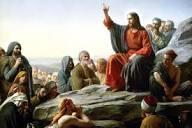
The Jewish people had been given the Ten Commandments and all the other precepts which made up the Law. That was what bound them together as the chosen people and gave them a road-map for living. Many people like Elizabeth and Zechariah obeyed them meticulously and lived exemplary lives. However the Law could also be used to enhance a person’s status in society, which is what the pharisees and scribes did. They paraded their virtue in public. They scorned all who could not attain their standards and who were regarded as sinners.
Jesus came to deliver a different message and to give a portrait of a God who dwelt with the rejected of society. From the mountain, where often the divine seemed to be more present, he gave the eight Beatitudes, where the meek, the suffering and the poor came into their own. Misfortune was often seen as punishment for sin. Jesus was asked by his disciples: “Rabbi, who sinned, this man or his parents, that he was born blind?” (John 9:2)
Prosperity was seen as a sign of God’s favour. Yet Jesus praised the poor in spirit who did not seek wealth and were content with what they had. He praised those who were peacemakers and those who showed mercy. Like his mother’s Magnificat, Jesus’ teaching turned worldly values upside down. The Beatitudes described a loving person, rather than one who was intent on ticking boxes. Jesus in his own life exemplified what he had taught.